Peter MALONE
Saturday, 18 September 2021 19:24
Rome Express

ROME EXPRESS
UK, 1932, 94 minutes, Black and white.
Conrad Veidt, Gordon Harker, Esther Ralston, Joan Barry, Harold Huth, Cedric Hardwicke, Donald Calthrop, Hugh Williams, Finlay Currie, Frank Vosper, Muriel Aked. Eliot Makeham.
Directed by Walter Forde.
Rome Express is a very early sound film from the British Film Industry. It is entertaining today, allowing for its dated style and characterisations. There is a vitality and pace about it even though the film has been used as a model for so many other train films - it is very reminiscent of Agatha Christie's Murder On The Orient Express. The screenplay was co-authored by Sidney Gilliat, who was later to use the same framework for his very successful film The Lady Vanishes, directed by Alfred Hitchcock. It was again used by Gilliat for a war atmosphere train ride in Night Train to Munich, directed by Carol Reed. All the familiar devices of the train leaving, the assembling of the characters, the interaction and the melodrama and crime are here. They were used, of course, for the disaster films of the '70s. The cast is very good and the photography and editing for its time is quite excellent. Conrad Veidt, the celebrated German actor, made his English debut in this film. John Paddy Carstairs directed Sleeping Car to Trieste (1948), a scene-by-scene remake of this film. Finlay Curry played the same role in both films.
1. The appeal of the train journey film? The journey, the artificial group of characters interacting, the possibility for crisis and solution en route? The format and style of the train film? The popularity of the genre? The influence of this film over the decades?
2. Trains: journeys, a variety of places and countries, stops and movement, customs, the confined space, the confined time, the artificial cross-section, the possibility of anonymity and discovery?
3. The quality of the film for 1932 - black and white photography, the editing and the sense of movement especially in the opening sequences with the group arriving at the station, pace, visual impact, characters and staging? Musical score?
4. A situation for murder, violence? Detection? The effect of the crisis on the lives of the passengers? How satisfyingly presented here?
5. The fluid assembly of the characters at the Paris station, their range, characteristics, style of introductions? The train itself and the details of its preparation for departure?
6. The quality of the screenplay in the staging of the character interactions and plot links: coincidences accidents, death and motivations, detection?
7. The range of characters and types - how well sketched? - the film star and her glamour, her being tired of it, her press agent and the satire on advertising, gags and stunts for publicity, the pressure on the star? Her relationship with Tony and the encounter on the train? Giving him an alibi? Her giving up career and escaping at the end? - Grant and his taking the girl on the trip, his wanting to be anonymous with her, the chance encounter with Bishop and his incessant talking, the meal and ignoring the girl, the preparation for the card games, the questions of compartments and the cover-up, the death of Poole and the blaming of Grant, the exposure of his trip, his decisions at the end? - McBain? and Mills - McBain? as the gruff millionaire, pushing Mills around, his interest in his own philanthropy and making a good impression, wanting the Van Dyke, his threats to Mills, the chance of getting the Van Dyke through the wrong briefcase, Mills threatening him and blackmailing him, the criminal searching his compartment, his saving the day and giving in to Mills, the ironic humour of his being ignored on arrival?
- Bishop and his incessant talking, complicating the situations, his theories about the death?
- Tony and his involvement with the criminal, hastily getting on the train, tracking down Poole, encountering the film star, the memories of the past, his decision to give up?
- Poole and his being scared, being put in the same compartment as the Chief of the Surete, his covering for Grant at the buffet. his joining in the game, his meeting with the criminals and the cat-and-mouse techniques, his escaping to the compartment and hitting Grant, his being murdered? The changes of briefcase?
- Conrad Veidt and his German menace and style, his being on the train and work with Tony, tracking down Poole, the control of the card game,, the searching of McBain's compartment, his being interrogated, the film star giving an alibi.. his being outwitted and escaping to his death?
- the Chief of the Surete, his seeming to be a bore. the discovery of his identity, his detective work?
8. The detective work and the rapid resolution of the murder?
9. The happy arrival at the destination with people's lives changed? The train ride and the image of journeys and the complexity of life? An enjoyable and satisfying example of the genre?
Published in Movie Reviews
Published in
Movie Reviews
Tagged under
Saturday, 18 September 2021 19:24
Romantic Englishwoman, The
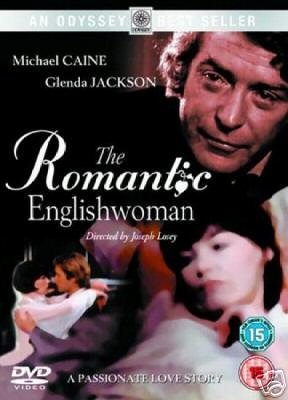
THE ROMANTIC ENGLISHWOMAN
UK, 1975, 116 minutes, Colour.
Glenda Jackson, Michael Calne, Helmut Berger, Marcus Richardson, Kate Nelliganf Rene Kolderhoff, Michel Lonsdale.
Directed by Joseph Losey.
Joseph Losey makes striking films. This one parodies soap-operas in its style (and explicitly in the imagination of the heroine) and aspires to some comment on women, their status as housewives and the nature of modern marriage. However, it seems to border perilously on what it is criticising. Glenda Jackson (seen, at last, doing housework instead of demented or dominating) does her best to show the frustrations of modern living, especially with such a suspicious and obtuse husband as Michael Caine portrays. Helmut Berger is an international smuggler and gigolo who moves into London suburbia. A strange character in a film that combines romance, thriller aspects and an exploration of character in a social context.
1. The significance of the title, the explanation? Elizabeth, at first, at Baden, holiday, running away? At home? Where was she most particularly romantic? The nature of romance? The emphasis on the Englishwoman as romantic? The wish to have freedom and have everything when it is not possible? Did this theme pervade the film?
2. The importance of colour, English and continental locations, London suburban houses, the contrast with the European countryside, the finale and the luxurious settings? The musical commentary? The visual style, for example, mirrors, images, photos? The use of imagination, especially the visualising of Lewis's screenplay? The contrast between reality and, unreality?
3. The focus of the title and the film on Elizabeth? How ordinary an Englishwoman, how ordinary a woman? The pressures on her running away, the effect of her train journey and her arrival in Baden? The effect of Baden and its holiday atmosphere, the casino, the spa? Her telephoning her husband? Her imaginative flirting with Thomas, her real flirting with him? The atmosphere of danger surrounding Thomas and her fascination? Lewis and his suspicion of her? The contrast with her arrival home, the change of plans, her first meeting with Lewis. the scene in the garden? Her ordinary housework and seeing her as an ordinary Englishwoman?
4. Elizabeth in the context of suburbia, washing, cleaning up the house, looking after her child? The contrast with going out with Lewis, the film producer, the meal, the idiotic atmosphere of parties, literary functions, clubs? Elizabeth as at home in this world?
5. The film's criticism of women? The role of housewife, boring life, the contrast with the exotic and the romantic? Should women yearn for this? The ambiguity of the screenplay? Lewis's imagination of how women should be, suspicions of his wife. the artificial dialogue and the posed tableaux of the film and of Lewis's screenplay?
6. How interesting a character was Lewis? Credible as Elizabeth's husband? what kind of nun was he, his literary talent, his being at home in the film world. Lewis at home, Miranda? His suspicions and telephoning? The games that he played and his manoeuvres? His language? The quality of his relationship with Elizabeth? In terms of love and sexuality, as father of David?
7. The contrast of Thomas with this English world? The scene on the train, the fascination in Baden, behaviour and manner as a gigolo, his drug pushing and the dramatics of the scene of his hiding the drugs on the roof, and their being spoilt by the rain? Was he idealised in the film? Presented as superior to Elizabeth and Lewis or not? The wanderer. the European, the poet? Attitudes towards sexuality, his following Elizabeth and using her? His allowing himself to be used by her?
8. How plausible was his use of the Fieldings? His mistake about authorship? The introductions, settling in, using the family and all they had to offer? His gratitude, working for Lewis, his indolence? How likeable was he? How was this illustrated in his relationship to David, Catherine, his effect on each of them?
9. The episode in the greenhouse and the effect on each of them? The build-up, fear. turning on of the lights?
10. The atmosphere of the home, in its detail, Catherine and her role, David? The chatter and gossip? Elizabeth’s hostility towards Catherine and the long scene of her reprimand? its significance, especially for Elizabeth? The comparison with Lewis' attack on Isabel? Isabel’s advice to Elizabeth and her meriting the attack?
11. Thomas and his theories of freedom, his ironic belief that he was free? The invitation to Elizabeth and her sudden decision for freedom? Was her leaving home credible, what did she gain? The relationship with Thomas, his gradual ignoring of her and going about his business?
12. The details of the pursuit, the gangster and his pursuit of Thomas, the involvement of Lewis? The character of Swan?
13. The irony of Lewis wanting to turn his screenplay into a thriller? The film turning into a thriller? Was it appropriate, a success?
14. How convincing was Swan's pursuing Thomas and taking him away? The effect on Elizabeth, her going home? How convincing her return? The effect of this experience on her and as a basis for the future?
15. How much insight into modern life, modern marriage, boredom and expectations?
16. Critics called this film pretentious. They accused it of trying to be arty, entertaining and realistic. The irony of the film was the film. The humour and the ironic touches about the characters and their situations? Did this balance out the pretensions? A good film?
Published in Movie Reviews
Published in
Movie Reviews
Tagged under
Saturday, 18 September 2021 19:24
Romantic Comedy
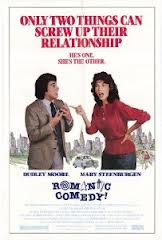
ROMANTIC COMEDY
US, 1982, 97 minutes, Colour.
Dudley Moore, Mary Steenburgen, Frances Sternhagen, Janet Eilber, Robyn Douglass, Ron Leibman.
Directed by Arthur Hiller.
Romantic Comedy is not quite! This film was adapted by author Bernard Slade from his play. Slade had much more success with his version of Same Time Next Year, less so with his version of Tribute.
However, the film directed by Arthur Hiller (director of a wide range of films from Love Story to The In-Laws?, Making Love and Teachers) is a vehicle for Dudley Moore. However, as with many of his films of the early '80s he plays a rather unsympathetic character - whom the audience seems to be meant to like. He was successful in Foul Play, 10, Arthur - less so in Wholly Moses, Six Weeks, Lovesick, Best Defence.
His leading lady is Oscar-winner Mary Steenbergen, an attractive daffy actress (Goin' South, Time After Time, Melvin and Howard, Ragtime). There is a good supporting cast with tough Frances Sternhagen as his agent, ballet dancer Janet Eilber (Whose Life Is It Anyway, Hard to Hold) as his wife and Robyn Douglass as a leading lady. Ron Leibman looks in as a journalist. Good ingredients, middling results.
1. The appeal of this kind of playwright's romance? Wit and repartee? Relationships? Success and failure story?
2. Production values - glossy colour locations, affluence? The theatre? Musical score?
3. The film as a Dudley Moore vehicle - his presence, size, affability? His unsympathetic role? His being matched by Mary Steenbergen?
4. Audience interest in the lives of playwrights, their ups and downs, personal lives, collaborations, theatrical successes? This portrait of the theatre?
5. Dudley Moore as Jason Carmichael - his Broadway success, his marriage to Alison, his extravagant lifestyle? His relationship with his agent Blanche and her looking after him? The arrival of Phoebe - with all the awkward comedy and his thinking she is the masseur etc.? Their working together, first lack of success, the string of hits? The two becoming friends? Jason exploiting Phoebe? The progress of the marriage, children, Alison and politics? The possibility of an affair between Jason and Phoebe - with Phoebe going off with Leo and marrying him? Her breaking off the partnership? Jason and the break-up of his marriage, his lack of success? His relationship with the leading lady? The final clash and fight? A new relationship - personal, professional? A future together?
6. Mary Steenbergen's style as Phoebe - her awkwardness, school teaching background, her play and Jason liking it? The arrival at the wedding and the misunderstandings? Their work together, her dedication, creativity? The ups and downs of their working partnership? Her friendship with Leo, his doing a story on them, the marriage, her going to Paris, her best-seller and success? Turning the book into a play? Jason asking her back, his fickleness, her response - and her seeming love for him?
7. Alison and her relationship with Jason, the background of family, wealth, her attention to her children, politics and the break-up of the marriage?
8. Blanche and her tough-mindedness, liking tor Jason, trying to organise his life, help with Phoebe? The buddy-friend?
9. Leo and his journalism, attraction towards Phoebe, proposal, the marriage, her success, the tensions?
10. The background of the theatre, the character of Kate Mallory and her ego, liaison with Jason? The background of affluent New York?
11. Traditional themes of comedy - how well treated?
Published in Movie Reviews
Published in
Movie Reviews
Tagged under
Saturday, 18 September 2021 19:24
Romancing the Stone
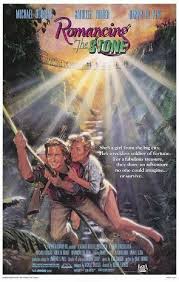
ROMANCING THE STONE
US, 1984, 100 minutes, Colour.
Michael Douglas, Kathleen Turner, Danny de Vito, Zack Norman, Alfonso Arau, Holland Taylor.
Directed by Robert Zemeckis.
Romancing the Stone was a very popular film of 1984. It owes a great deal to Raiders of the Lost Ark and the enjoyable exaggerated adventures in exotic locations. However, it is a Raiders for an adult audience.
The film was produced by Michael Douglas and he stars as an adventure hero in Colombia - but does not have the charismatic style of such heroes as Harrison Ford. However, he acquits himself enjoyably. The focus of the film is on Kathleen Turner (who made such impact as the villainess in Body Heat). She is a writer of pulp romances who lives her fantasies and is suddenly caught up in a real-life adventure. Cars go over waterfalls, the heroine swings across ravines on vines etc. etc.
There is a humorous opening parody of the romantic western (to the melody of How the West Was Won) and plenty of adventures. Light-hearted, colourful entertainment.
1. The popularity of the adventure hero in the '80s? An adventure for adults? For both men and women? The influence of such films as Raiders of the Lost Ark? The satire on popular romantic adventures?
2. Panavision photography, New York, Mexican locations standing in for Colombia? The range of locations, the jungle. weather? The special effects? The romantic adventure score?
3. The title and the focus on pulp novels? Audiences enjoying them - and the ingredients? The film transcending the pulp romance?
4. The opening and the western styles, the violence. the sex, the hard-done-by heroine, the dreadful villain. the ideal hero? The cliches done colourfully? The music from How the West Was Won? Joan in tears at her own novel?
5. Joan as heroine: her writing, her success, her emotional involvement in her own novels, her weeping? Her lonely apartment, her cat? Going out, the encounter with her publisher, her publisher trying to arrange romance and dates? The violence and her room? The murder in the corridor? The mysterious item in the mail? Phone calls? Her decision to leave New York, the dangers, the set-up?
6. Kathleen Turner's style as Joan? The demure heroine becoming strong? Her flight and her wariness, illness? The arrival, the wrong bus, the advice? The atmosphere of Colombia? The passengers on the bus, her being stalked? The crash, the shooting, Jack arriving on the horizon like one of her heroes, her having to bargain with his to take her to safety, the travellers' cheques, walking, the mud, slithering. falling, over cliffs? The humour and the feeling of the pursuit? The dangers of the high bridge and its collapsing? Swinging on vines? Arriving in the town, suspicion, the mountains of Colombia and hostility, the sudden admirer and the wealth and luxury away in the mountains (and his having read all her books)? The chase, the car, the growing relationship with Jack? The hotel, the dancing? Their relationship? The discovery of the stone? Their being robbed, captured? The climax? The alligator and the bite? The return to America and her writing her novel - and Jack's arriving with the yacht? Her love for her sister, grief? A timid writer involved in her imaginary realities?
7. Jack as hero, the law, the catching of birds, losing his birds, the crash, the shooting, bargaining with Joan, helping? The macho style? The adventures? His disbelief? Relationship - clothes, dancing, glamour? The stone, the final heroism? His getting his yacht?
8. The Colombian villains? The murders in New York? The wrong bus? Stalking Joan, the paramilitary groups, the pursuit, the cruelty, the alligators? The film's comment on military power in Latin American countries?
9. Ralph and Ira as ineffectual comic villains, the kidnapping of Joan's sister, Ira following, Ralph and the alligators and their teeth. the phone calls, Ira being pursued, the final confrontation, dangers?
10. The comic interlude with the fan in the Colombian mountains -and the aura of fans admiring heroines?
11. A satisfying blend of adventure and romance? The battle of the sexes? The emphasis on feminism? The mood of the '80s?
Published in Movie Reviews
Published in
Movie Reviews
Tagged under
Saturday, 18 September 2021 19:24
Romance on the High Seas
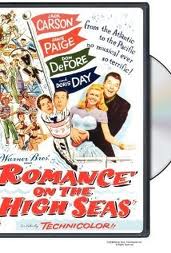
ROMANCE ON THE HIGH SEAS
US, 1948, 99 minutes, Colour.
Jack Carson, Janis Paige, Don Defore, Doris Day, Oscar Levant, S. Z. Sakall, Eric Blore, Franklin Pangborn, Fortunio Bonanova.
Directed by Michael Curtiz.
Romance on the High Seas is a pleasant lightweight Warner Bros musical of the late '40s - the film which introduced Doris Day to the screen (her career was echoed in a film soon after, also directed by Michael Curtiz, My Dream is Yours). She makes the transition from radio star to screen star delightfully and with some verve which she continued during the '50s and into more dramatic roles in the '60s. The screenplay was written by Julius J. and Philip G. Epstein (Casablanca) with the help of Billy Wilder collaborator I.A.L. Diamond. The songs, including 'It's Magic', come from Jule Styne and Sammy Cahn. Direction is by action director Michael Curtiz who moved into popular comedies and musicals in the late 1940s. Doris' leading man is Jack Carson (also in Starlift and My Dream is Yours). She has an excellent supporting cast with Janis Paige and Don Defore as a suspicious married couple, Oscar Levant playing the piano, Eric Blore and Franklin Pangborn doing their brief comedy-type roles as well as S. Z. Sakall. The story is about suspicions in marriage of an executive and his wife with S. Z. Sakall as a benign uncle. Doris goes as the wife on a trip and achieves fame in singing. Jack Carson is a private detective who falls in love with her. There are pleasant songs and comic touches. A pleasing example of the Warner Bros. musical comedy style - repeated so often in the late '40s and early '50s with Doris and leading men like Gordon Macrae, Ray Bolger.
Published in Movie Reviews
Published in
Movie Reviews
Tagged under
Saturday, 18 September 2021 19:24
RollingThunder
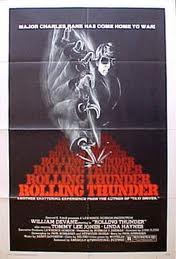
ROLLING THUNDER
US, 1977, 90 Minutes, Colour.
William Devane, Tommy Lee Jones, Linda Haynes, Lisa Richards.
Directed by John Flynn.
Though once again a personal vengeance thriller raising strongly felt questions about response to gross violence when the law seem inadequate, this film has several very interesting features. The first part showing the veterans'
homecoming and difficult adaptation is well done. Written by Paul Schrader, writer of Carrie and Taxi Driver (and thematically linked with the latter), the film criticises complacent America in the light of the fighting in Vietnam and the endurance of tortured soldiers. Waging war was justified and heroic there, what of war after abuses in Texas, U.S.A.? William Devane is good as the hero and Linda Haynes particularly good as his girlfriend. Grimly interesting.
1. The overall impact of the film? As representing American issues of the 70G? The effect on an American audience, non-American audience? Australia and the aftermath of Vietnam?
2. The background of Vietnam, American involvement, violence and death? A war far away from America? The atmosphere of patriotism of the 60s and 70s? The American image and the military image of involvement and heroism? Safeguarding American society? How is the film a critique of these attitudes?
3. The significance of the title, the indication of the vengeance theme? Who has the right to such vengeance? The loner individual and his wreaking of vengeance? Law and order, police?
4. The atmosphere of the opening and the presentation of San Antonio and the people of Texas? Mexico by contrast? The authentic location atmosphere of the film? Colour photography, musical score?
5. The opening sequence and the return home with the silent flying of the jet? The contrast with the noisy ceremonial jubilant group for the return? Heroism, the significance of the speeches, American glory, the atmosphere of tribute to the veterans? The attitudes of the soldiers as they returned after being away so long, after their imprisonment? The ceremonial especially for Charlie and the presentation by Linda of the coins? The visualizing of John and his family, Charlie and his wife and son?
6. The contrast with American society at home? How did American society fall to live up to its ideals and image? Charlie's wife welcoming him home, the son who seemed a stranger? Charlie's trying to adapt himself to the house? The drama of his wife telling him about the failure of the marriage, her adultery, the prospect of divorce? What message communicated about what happens when people are away? Human strengths and weaknesses? Endurance? Charlie and the endurance of torture and imprisonment? His wife and her failure to endure the loneliness?
7. The portrayal of the first night home: Charlie in his room alone, reliving the memories and the visualizing of the torture sequences? The editing in of these sequences? Themes indicated of adjustment? The contrast with Linda's help and his wife's?
8. His playing with his son and his hold over his son? The hope to build a life with him even though his wife wants to leave? The awkwardness of the sequences with Cliff and the discussion about what had happened? The discussion about what was to happen - and the re-enacting of the torture? Cliff as a torturer but unable to look at it?
9. The ugliness of the robbery and the deaths? The personality of the criminals and their mean-mindedness in wanting his coins? The brutality of their torture and the visualizing of the Vietnam torture? How were they different to his wife and to Cliff torturing Charlie? The extent of their torture and their exasperation at not making him speak? The ugliness of their violence in killing his wife and child as a revenge and a challenge? Their words and their harsh comments on his heroism?
10. The effect on Charlie? His silence about their identity? The physical injuries and the artificial hand? The secrecy of his intentions? John's visit to the hospital and his later getting him to help? His returning to Linda and his getting her to help and using her? Cliff's willingness to help him and track him down? The irony of Cliff dying for this cause?
11. The effect of the return from Vietnam and his seeming deadness? The comments on being alive and dead? A man brutalized in a war for his country returning to be disillusioned and exercising the same kind of brutality? Were his feelings and attitudes made clear, justified? The rights and wrongs of his actions, of his feelings? Cliff and his searching out the car and following? The violence and ugliness of his death? John's attitude of helping? Linda and her help and her warnings about the police? Why did she not ring the police and follow through with the call?
12. The portrait of Linda as a woman in San Antonio, her loneliness, age. experience? Her devotion to Charlie as a groupie? How well did the film portray her background and make a character of her? Her decision to leave her job, going to the unknown and help, her reaction to being a decoy? Her reaction to the brutality? The night at the motel and Charlie's decision to leave her behind?
13. The Mexican sequences of violence and torture? Charlie's shrewdness in assembling all the people after their being terrorized and catching them in the one place? The set-up and the sequence in the brothel? The violent shooting and smashing? The physical presentation of violence and vengeance being wreaked? where did audience sympathies lie?
14. The presentation of this violence as a war at home, the using of war tactics against this enemy? How did the film move the theme from law and order into open warfare themes? The film's exploration of the good and evil, human motivations, strengths and weaknesses, ugliness? A critical view in action fashion of American issues of the 70s?
Published in Movie Reviews
Published in
Movie Reviews
Tagged under
Saturday, 18 September 2021 19:24
Rolling Man, The
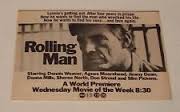
THE ROLLING MAN
US, 1972, 73 minutes, Colour.
Dennis Weaver, Agnes Moorhead, Don Stroud, Donna Mills, Sheree North.
Directed by Peter Hyams.
The Rolling Man is an attractive and interesting telemovie with Dennis Weaver at his best. There is a very strong
supporting cast including Agnes Moorhead. It is the story of a naive man, with Vietnam experience and all kinds of
bruises in life. He keeps going, especially in the search for his children after his prison experience. It is a fine piece of Americana with glimpses of typically American characters and situations. Direction is by Peter Hyams, a screenwriter (Telefon) and director of such films as Busting, Our Time, Peeper. Very enjoyable and with some themes worth discussing; also beautifully photographed on location.
1 . An entertaining and interesting film? The blend of entertainment and serious them? The impact as a telemovie for a home audience?
2. The film as a piece of Americana? The particularly American tones of the characters and themes, the universal values - a man, his integrity, his changing, family, responsibility?
3. The colour photography, the locations, the South, Texas and California? The attractive photography and the setting and atmosphere for the characters and themes? Creating its world well? The music, the theme song and its lyrics? A cross-section of America?
4. Dennis Weaver's interpretation of Lonnie? The significance of the title, the ordination Middle American.. lacking in initiative,' a kind man? The Vietnam experience, his working for others, his trust in his wife, Crystal, friendship with Harold? His doing his work with the stock cars, his muted ambitions? His friendship with Grandma? Love for his kids? His anger against Harold, the humiliation in the bar, the chase and the crash and the violent outburst against Harold? His sense of justice and accepting his fate? His going to prison, the conversation in the bus, the prison sequences and the change in him, did he change for the better, worse? Appearances, reality?
5. The significance of the changes in Lonnie, assuming roles, telling lies, pretending that he was bigger than he was yet the reality underneath? His revisiting the family and friends - the encounter with Grandma and her illness, the girlfriend and his lying to her and seducing her, seeing his old employer and talking about the job? Their loyalty to him? The importance of the encounter with Ruby. the exchange of conversation about unreal ambitions? Spending the night with Ruby? Ringing about his children from her phone?
6. The pursuit of the boys, a goal in life, the pursuit of Harold and vengeance? The various families and his anguish in looking for his children?
7. The character of Harold, as a type. drinking. the violent ride, Crystal's death? The re-encounter with Lonnie, the fast ride and his fear? Lonnie gaining self-respect by this experience with Harold?
8. The girl and her love for Lonnie, finding his boys, the possibilities for a future?
9. The episodic nature of the film, the quality of the various episodes and the stars bringing strength to their small but telling roles? Grandma, Ruby, the station owner etc.? The characters as American types? Standards and values? An entertaining parable about the meaning of life and responsibility?
Published in Movie Reviews
Published in
Movie Reviews
Tagged under
Saturday, 18 September 2021 19:24
Rollercoaster
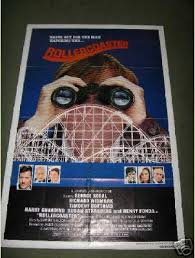
ROLLERCOASTER
US, 1977, 118 minutes, Colour.
George Segal, Richard Widmark, Timothy Bottoms, Henry Fonda, Susan Strasberg, Harry Guardino.
Directed by James Goldstone.
Rollercoaster does not pretend to be anything more than a gripping thriller using Universal's' Sensurround' process. It succeeds quite well, showing the atmosphere of the entertainment parks, an alarmingly realistic crash and the technique of trying to trap a skilful bomber and defuse his wares. Much of the success comes from George Segal's engaging hero - easy for the audience to identify with him and be involved in solving the case. Timothy Bottoms (revealed at once as the bomber) is appropriately deadly calm and controlled. Naturally much of the footage is of rollercoaster runs, exhilarating or terrifying according to your tastes. A stern Richard Widmark is in charge. Entertaining.
1. How successful and entertaining a thriller? Plot, characters, action, suspense? 'Sensurround'? No aims at any message, yet communicating something about society, human nature?
2. The contribution of the 'Sensurround' effects for the carnival atmosphere, excitement? A gimmick, integral to the film?
3. The contribution of colour, Panavision photography: the various carnivals, scenes of Chicago? The atmosphere of the music for the carnivals as well as the menace? Contribution to atmosphere? The atmosphere of carnivals in America, the parks, the breadth of scope? The contrast with the world of offices, the F.B.I.? The contrast with ordinary homes and lives? A picture of America in the 70s?
4. The film's devices for gaining audience involvement? The initial portrayal of the young man, the audience watching him, suspenseful music, the atmosphere of explosives and sabotage? The carnival situation and the build-up of suspense and the picturing of such destruction? The transition to Pittsburg with the suggestions of destruction? The involvement with the young man and his plans, bugging the rooms in Chicago, telephone calls, the complicated devices of getting the money? The final situation and his sabotage and his failure?
5. How well did Timothy Bottoms portray the young man: as personal, as anonymous? His initial watching the roller-coaster, his planting the devices, his callous killing of people? The monotony of his voice, his intelligence and yet his lack of feeling? His hold over Harry Calder? The question of money? His skills, electronics, engineering? The audacity of his bugging the office disguised as a waiter? A good mine gone corrupt? His personal involvement with the money exchange in Virginia? His desperate plan at the end? The irony of his being caught and confronting Harry? His death?
6. The impact of the rollercoaster destruction? People's lives being lost, the crash, the impact of the special effects? The taping and the bugging? The technology employed for the exchange of the money? The psychology of anticipating his presence at Magic Mountain at the inauguration, the eth of July? The various attempts to trick the young man? His desperation?
7. The impact of rollercoasters and their exhilaration, fear, safety? The amount of film given to visual presentation of the rides? Harry at Richmond, the young man on the revolution at Magic Mountain? The people and their enjoyment of such thrills?
8. The importance of George Segal's characterization of Harry? A credible hero? As a character, his work? His place in the office, his not rising to important positions, sense of honesty? As a contrast with the young man, practical man anticipating his thinking? The importance of the background of his marriage, daughter and the buying of the pet, the meals? The relationship with Fran? And their presence at Magic Mountain? His work, interrogating the people after the accident, the confrontation with Simon Davenport, his presence in Chicago, Hoyt and his attitude towards him? His involvement in solving the case? An ordinary hero that audiences could identify with?
9. The hero with initiative: at Richmond and the various details of the money exchange, the radio, the signs, the messengers and the exchange of the money? His preoccupation even when out with his daughter and Fran, his anticipation of Magic Mountain and his being justified? His being the man to detect and confront the young man?
10. The picture of Hoyt and the FBI: a sense of realism, their power, skill at their jobs, sending medals of congratulations etc.? The carnival bosses and the involvement with the extortion?
11. The picture of the ordinary police, searching the track, their disguises, their skill in keeping the fairgrounds under surveillance?
12. The portrayal of ordinary people, the passengers in the rollercoaster, the people at work at the fairgrounds? Ordinary people in danger?
13. The contribution of the crisp dialogue, the sparking of interchanges and interactions? Why is such dialogue and situations enjoyable?
14. Themes of danger, society, challenges, risks? Modern sabotage?
Published in Movie Reviews
Published in
Movie Reviews
Tagged under
Saturday, 18 September 2021 19:24
Rollerball
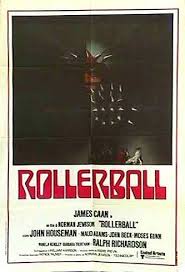
ROLLERBALL
US, 1975, 129 minutes, Colour.
James Caan, John Houseman, Maud Adams, John Beck, Moses Gunn, Pamela Hensley, Ralph Richardson.
Directed by Norman Jewison.
Rollerball has a vast amount to offer - from its stylish photography of sport action, futuristic sets, Andre Previn score to its science-fiction and political themes, a very carefully-made film (although some have said ‘pretentiously
studied'). A future society (sufficiently close to our own in styles of luxury, selfish ambitions and fascist sport blood-lust) is symbolised in corporate society's masses-fulfilling game, rollerball - designed to show the futility of individual effort. But it produces its rebel, the champion Jonathan E., the threat to society. James Caan and John Houseman as champion and menacing executive are excellent. Superior science-fiction and film-making.
Rollerball was remade, unsuccessfully, by John Mc Tiernan in 2000 with Chris Klein too gentle an actor in the central role.
1. The main impact of this film? It was acclaimed by many critics, condemned by many. Why?
2. The film as one of the 70s in terms of style. content, moral preoccupations?
3. The film as science-fiction? How successful? What impact? Comment on its picture of the future, the picture of society, especially at the party. sport? The world of luxury, the elimination of poverty and wars? The roles of computers? Executive management?
4. Comment on the political implications of the film: the background of the corporate wars, national bankruptcies,, the nature of control, the executives and the visualising of their administration by television and consent? Luxury and decadence to keep people quiet? The amount of mental control? Moral control over peoples lives e.g. Jonathan’s loosing Ella? Ella working for the executives? Rollerball within this context?
5. How satisfactory was the Rollerball game as a symbol of this society? The explanations of the game, its use? Its outlet for people's aggressiveness? The fact that individual effort was futile? The background of Rollerderbys. motorbikes, football etc.?
6. The film's use of the three games for the structure? The presentation of detail, the ingredients? The violence and the cruelty? The inhumanity? The initial impact of the film by seeing a game? The morale-boosting talk with the men? The details of the training and Jonathan’s skill? People looking at the replays? The documentary on Jonathan? The clash at Tokyo (the racist overtones as well?) , the changing of the rules, the growing violence, the audience and the players? The final culmination with the elimination of rules? Validly presented violence? The physical and psychological involvement in the game?
7. The role of the individual in future society? The way he was subdued? Bartholomew interviewing Jonathan, threatening him? The use of the women? Moonpie as a typical subdued individual? The mystique of the game? The temporary mystique of the champion? The role of Moonpie being kept alive as a vegetable indicating Jonathan's stand to preserve the individual? The expendability of all the players?
8. How interesting a hero was Jonathan? His skill and his cruelty in the game, yet his ordinariness, his being praised in the rooms, his talk at Bartholomew’s? His participation in the ways of society for example,, silent meditation, yet his use of luxury? His refusal to resign? His skill at training? His role at the party? His doing deals to see Ella again? His relationship with the mistresses? His friendship for Moonpie? Relationship with Cletus and using his advice? The visit to Geneva and his seeking out more questions? The significance of the re-union with Ella in the rain? The ending and his assertion of his individuality? Of what was Jonathan E. the symbol? The political overtones of Jonathan as hero? The final optimism implied in the presentation of Jonathan as hero? The final climax?
9. The contrast with Bartholomew? The sinister executive, controlling people, the use of drugs, meditative silence, the nature of decisions, his fear when his authority was threatened? The manner of making decisions with the other executives? The final overthrow of Bartholomew?
10. The presentation of women in this future world? As controlled by the executives, even to marriage, sexual relationships, friendship, spying? The various mistresses? Ella's life and her relationship to Jonathan? The women at the party?
11. The role of men in this society? As players, as executive potential, doctors, for instance, administering death?
12. The presentation of future society and the film's moral comment on it, e.g. the clerk at the library, the people at the party, the shooting of the trees?
13. People in general, the screaming crowds, love of violence, the hero worship of the champion?
14. Incidental characters eg. Ralph Richardson's librarian? What did they contribute to the film?
15. Cletus in his friendship and his insight into the workings of the executives? The trainer and his urging the men on, etc.?
16. What were the major political themes, science-fiction themes, humane themes?
Published in Movie Reviews
Published in
Movie Reviews
Tagged under
Saturday, 18 September 2021 19:24
Roe vs Wade
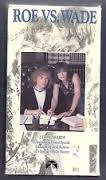
ROE vs WADE
US, 1989, 92 minutes, Colour.
Holly Hunter, Amy Madigan, James Gammon, Kathy Bates, Terry O'Quinn.
Directed by Gregory Hoblitt.
Roe vs Wade is a television docu-drama about the famous case in Texas which was brought before the Supreme Court in the early '70s and opened the way for abortion being decriminalised. The film was made by the NBC American network and screened in May 1989, at a time when the Supreme Court was reconsidering the Roe vs Wade decision.
The film takes the point of view of the pro-choice stance. However, it also portrays aspects of pro-life stances. The film re-creates the basic situation - based on a true story, rather than presenting a true story - and fictionalises the original woman who became the anonymous Jane Roe of the case.
Holly Hunter (Raising Arizona, Broadcast News, Miss Firecracker is very good as the ill-educated carnival roustabout Ellen, who wants the abortion and whose case is brought before the Texas and Supreme Courts. Amy Madigan is also very good as the lawyer. Terry O'Quinn (The Stepfather) is Jay Floyd, the attorney who argued the anti-abortion case.
The film highlights in its drama many aspects of the abortion debate: the role of the police, the backyard and ugly abortions, the philosophical questions about women's rights to their own body, the ethical questions of the life of the child. While the film does take the point of view pro-abortion, it is a dramatisation of the point of view which raises emotional questions as well as dramatising ethical questions.
Gregory Hoblitt directed episodes of Hill Street Blues and moved into feature films with Primal Fear, Fallen, Frequency, Hart's War.
1. The issue of abortion? Pro-abortion, pro-life? Questions of pro-choice? The American background, the law? Moral issues? The epilogue with its comment about the divisive nature of the debate about abortion in the U.S?
2. The television treatment of the issues, for the widest possible audience, the dramatising of the issues, asking for emotional response, presenting facts and their interpretation? Ethical principles?
3. Audience knowledge of the abortion debate? Their own stances? The issues in the U.S? The repercussions?
4. Attitudes towards abortion, pro-life, pro-choice, abortion on demand? The history of abortion? Law in the 18th century, changes in the 19th. century? The prevalence of backstreet abortions? The development of techniques for
abortion? The role of the law?
5. The stance of the film, of each character, dramatising the stances?
6. The film based on a true story, fictionalising the characters? Giving dates, a diary format?
7. Holly Hunter's portrayal of Ellen: age, experience, family, at the carnival (and the irony of showing the freaks at the beginning of the film)? Her mother looking after Cheryl? Her phoning her, the clash between mother and daughter? Her second pregnancy, unwillingness to marry? Experience of divorce? Her explanation of her first marriage and pregnancy? Going to the doctor, lying that she had been raped in order to get an abortion? The lawyer? The visit to the backstreet abortionist and her horror? The police car going past? Her going to her father? The question of adoption or not - and her remark about not knowing -if adoptive parents would be brutal to the child?. The dilemma? Her position in society, reference to herself as trash? Mental and emotional state? The opportunity or not for abortion?
8. Sarah and Ron, Linda, their legal work, the abortion campaign, their contacts? The interview with Ellen at the coffee shop? Her lying about the rape? Her agreeing to go for the case? To wait? The long preparation of the case, the nature of the law, nervousness all round, groups and their
support?
9. Jay Floyd and Wade? The government of Texas, stances? Floyd as a bachelor, his pro-life beliefs and stances, the law and interpretation?
10. Ellen pregnant, searching for jobs, living with her friend? Her discussions with the lawyers, the winning of the case but the appeal preventing her from having an abortion? The birth of the child, its health, her not seeing it or knowing whether it was a boy. or a girl, giving it for adoption? Her visit to her mother, her mother's hostility? Her daughter turning away? Living with her friend, the various jobs? Sarah calling - and Ellen chiding her for her neglect?
11. The court proceedings, the processes, the putting of cases, the winning of the case in Texas, the nature of the appeals? The appeal to the Supreme Court and the wait whether the Supreme Court would accept the case?
12. Floyd and the importance of the case, his preparation of the pro-life argument, his personal involvement? Discussions with Wade?
13. Sarah and her tension, the support of the group, Linda having to pull out, going to New York, the promises of help but not giving any; the phone call to Ron, his coming, helping her with the brief, the point about the law applying only to persons who are born, not before their birth? The rehearsal
of the presentation?
14. The presentation, the Justices present, their interventions and questions? Sarah and her presentation? Floyd awkward?
15. The vote, the consequences, the opening up of the availability of abortion in the U.S., the subsequent appeals, the appeal being heard at the time of the screening of the film?
16. The finale with Ellen, her friend assuring her that she had achieved something in life, that she was somebody?
17. The point of view of the film, the attitude of pro-life audiences? Democracy and the freedom to express and dramatise an opinion?
Published in Movie Reviews
Published in
Movie Reviews
Tagged under